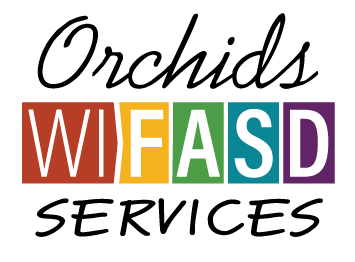Training and Information for Mental Health Professionals
Information Packet
The following links will create a brief informational packet of documents for you to print or download and give to a mental health treatment provider who has encountered or may encounter a child or adult with an FASD.
- Cover Page
- Differences Between FASD & Autism
- Understanding Behaviors of Fetal Alcohol Spectrum Disorders (FASD)
- Overlapping Behavioral Characteristics & Related Mental Health Diagnoses in Children
- How Fetal Alcohol Spectrum Disorders Co-Occur With Mental Illness
FASD-Informed Certificate
Spend 2 hours reading and viewing the resources on this page. Then take a short quiz and obtain your certificate. Coming soon!!
Mental health providers are likely to encounter individuals with FASD in their practice whether they are counselors, therapists, psychologists, social workers, psychiatrists, or behavioral therapists. Clients with an FASD are frequently diagnosed with multiple mental health diagnoses such as ADHD, Autism, ODD, and OCD and the traditional treatments for these conditions rarely work well for them, leading to treatment failures. It is important to identify whether an FASD may underlie and be co-occurring with mental health issues so that more effective treatment can be offered that will take the special needs of an individual with FASD into account.
Issues:
- People with FASD are often unsuccessful in traditional treatment programs
- Mental and behavioral health treatment providers must understand the characteristics and needs of people with FASD in order to provide effective treatment
- The following may interfere with treatment
- Difficulty understanding the “purpose” of therapy
- Memory – knew it yesterday, forgot it today
- Missed appointments due to memory issues
- Slower processing, especially with verbal information
- Difficulty in groups – may become bored, overwhelmed, fail to process information or to be unable to respond when put on the spot
- Concrete and immediate minds may not grasp abstract concepts such as “responsibility”, “truth”
- Inability to make plans, set goals for treatment
- Inability to report internal experiences or changes over time
- Limited cognitive processing of awareness of “thoughts”
- May become focused on concrete meaning of words or processes
Resources for Understanding and Adapting Therapy for people with FASD
- FASD: A Guide for Mental Health Professionals
- Fetal Alcohol Spectrum Disorders: A Review for Mental Health Professionals
- Overview of Fetal Alcohol Spectrum Disorders for Mental Health Professionals
- Tailoring Treatment for Individuals with an FASD – (see Chap 2.4, p. 54)
- How Fetal Alcohol Spectrum Disorders can Co-occur with Mental Illness
- Making your program more accessible for people with disabilities
- Fetal Alcohol Spectrum Disorders: Neuropsychological and Behavioral Features
- Psychotropic Medication Algorithm for FASD/Prenatal Alcohol Exposure – When considering psychotropic medication for a patient with FASD or prenatal alcohol exposure, please consult this psychotropic medication algorithm for individuals diagnosed with FASD or with prenatal alcohol exposure.
- Short videos from Dan Dubovsky
- Mental Health Disorders and FASD
- The Approach
- Strategies for Improving Outcomes
- Strengths of students with FASD (useful for therapists as well)
- Comparing OD, ADHD, and FASD
Guidance for Diagnosing ND-PAE
- Key Findings: Neurobehavioral Disorder Associated with Prenatal Alcohol Exposure
- Neurobehavioral Disorder Associated With Prenatal Alcohol Exposure
Training Programs
NEW: THE SAFEST CHOICE LEARNING COLLABORATIVE
The SAFEST Choice Learning Collaborative, a joint project of Proof Alliance and the Boston Medical Center, is a virtual FASD medical training program for teams at health centers and tribal clinics in the Upper Midwest and New England. Participating clinics are grouped into prenatal- or pediatric-focused cohorts to learn specialty-specific core competencies: the Prenatal Cohort will learn screening techniques and how to effectively counsel patients on the effects of prenatal alcohol exposure, while the Pediatric Cohort will learn how to screen children and adolescents who may have FASD. Together, these courses offer medical providers a streamlined guide to prevent and address FASD across the lifespan.
Cost of participation will be covered by the program, which receives funding from the Health Resources and Human Services Administration (HRSA). Each health center will receive:
- Free Continuing Education (CME, CNE, and Social Work) and MOC Part 2 credits
- Ongoing, individualized training and assistance to address implementation challenges
- A modest stipend
The program will begin in May, 2022. After an introductory webinar there will be ten 60-minute virtual ECHO ® (Extension for Community Healthcare Outcomes) sessions held on one Monday morning per month and delivered over the course of 12 months. Each session will provide a brief lecture by experts, case-based learning and collaborative problem-solving. No clinical data reporting will be required. Participating clinics are encouraged to invite all appropriate staff who will be involved in implementation of FASD prevention and care; this may include family physicians, pediatricians, OB/GYNs, NPs, PAs, CNMs, other medical personnel, behavioral health staff, and paraprofessionals such as community health and outreach workers.
For more information, contact safestchoice@bmc.org.
